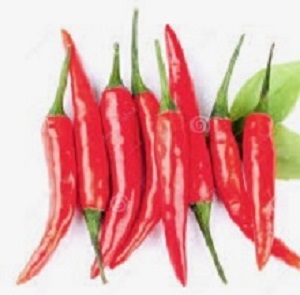 A large population-based prospective study in the US found that consumption of hot red chili pepper was associated with 13% reduction in total mortality, primarily in deaths due to heart disease or stroke.
A large population-based prospective study in the US found that consumption of hot red chili pepper was associated with 13% reduction in total mortality, primarily in deaths due to heart disease or stroke.
Hot red chili peppers may be a beneficial component of the diet, say researchers at the Larner College of Medicine at the University of Vermont, who found that consumption of hot red chili peppers is associated with a 13% reduction in total mortality – primarily in deaths due to heart disease or stroke – in a large prospective study.
Going back for centuries, peppers and spices have been thought to be beneficial in the treatment of diseases, but only one other study – conducted in China and published in 2015 – has previously examined chili pepper consumption and its association with mortality. This new study corroborates the earlier study's findings.
Using National Health and Nutritional Examination Survey (NHANES) III data collected from more than 16,000 Americans who were followed for up to 23 years, medical student Mustafa Chopan and professor of medicine Dr Benjamin Littenberg, examined the baseline characteristics of the participants according to hot red chili pepper consumption.
They found that consumers of hot red chili peppers tended to be "younger, male, white, Mexican-American, married, and to smoke cigarettes, drink alcohol, and consume more vegetables and meats . . . had lower HDL-cholesterol, lower income, and less education," in comparison to participants who did not consume red chili peppers. They examined data from a median follow-up of 18.9 years and observed the number of deaths and then analysed specific causes of death.
"Although the mechanism by which peppers could delay mortality is far from certain, Transient Receptor Potential (TRP) channels, which are primary receptors for pungent agents such as capsaicin (the principal component in chili peppers), may in part be responsible for the observed relationship," say the study authors.
There are some possible explanations for red chili peppers' health benefits, state Chopan and Littenberg in the study. Among them are the fact that capsaicin is believed to play a role in cellular and molecular mechanisms that prevent obesity and modulate coronary blood flow, and also possesses antimicrobial properties that "may indirectly affect the host by altering the gut microbiota."
"Because our study adds to the generalisability of previous findings, chili pepper – or even spicy food – consumption may become a dietary recommendation and/or fuel further research in the form of clinical trials," says Chopan.
Abstract
The evidence base for the health effects of spice consumption is insufficient, with only one large population-based study and no reports from Europe or North America. Our objective was to analyze the association between consumption of hot red chili peppers and mortality, using a population-based prospective cohort from the National Health and Nutritional Examination Survey (NHANES) III, a representative sample of US non-institutionalized adults, in which participants were surveyed from 1988 to 1994. The frequency of hot red chili pepper consumption was measured in 16,179 participants at least 18 years of age. Total and cause-specific mortality were the main outcome measures. During 273,877 person-years of follow-up (median 18.9 years), a total of 4,946 deaths were observed. Total mortality for participants who consumed hot red chili peppers was 21.6% compared to 33.6% for those who did not (absolute risk reduction of 12%; relative risk of 0.64). Adjusted for demographic, lifestyle, and clinical characteristics, the hazard ratio was 0.87 (P = 0.01; 95% Confidence Interval 0.77, 0.97). Consumption of hot red chili peppers was associated with a 13% reduction in the instantaneous hazard of death. Similar, but statistically nonsignificant trends were seen for deaths from vascular disease, but not from other causes. In this large population-based prospective study, the consumption of hot red chili pepper was associated with reduced mortality. Hot red chili peppers may be a beneficial component of the diet.
Authors
Mustafa Chopan, Benjamin Littenberg
[link url="https://www.sciencedaily.com/releases/2017/01/170113133047.htm"]University of Vermont material[/link]
[link url="http://journals.plos.org/plosone/article?id=10.1371/journal.pone.0169876"]PLOS One abstract[/link]
